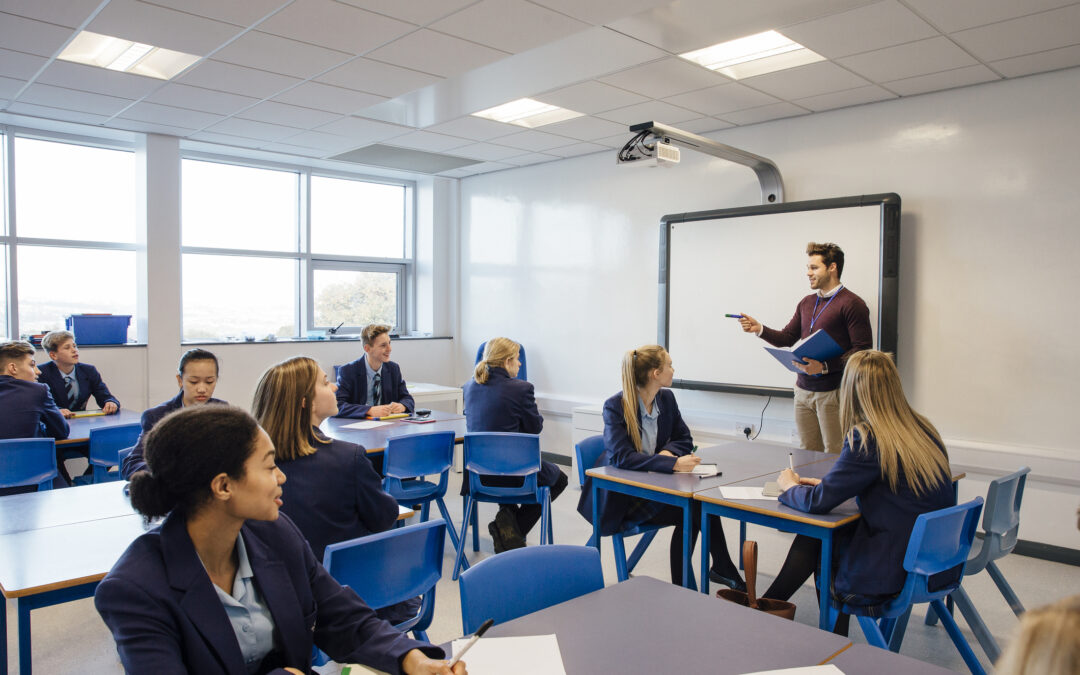
Day workshop in Cognitive Behavioural Therapy effectively reduces depression in 16-18 year olds
Day workshop in Cognitive Behavioural Therapy effectively reduces depression in 16-18 year olds
The Brief Educational workshops in Secondary Schools Trial found a day-long CBT course is an effective means of improving young people’s mental health.

New research from the Institute of Psychiatry, Psychology & Neuroscience (IoPPN) at King’s College London has found that providing 16-18 year olds with a day-long course in Cognitive Behavioral Therapy (CBT) was both a clinically and cost-effective means of improving their mental health.
The trial, known as Brief Educational workshops in Secondary Schools Trial (BESST) and published in The Lancet Psychiatry, was successfully adapted from the DISCOVER program, which was designed to help adults manage their feelings of stress. The study has been funded by the National Institute for Health and Care Research (NIHR).
Around one in 12 young people in England currently experience anxiety or depression. Despite this, the large majority remain untreated, and almost a quarter (24%) have no contact with specialist Child and Adolescent Mental Health Services (CAMHS).
This study recruited 900 students from 57 schools in England. Half were provided with signposting to mental health services and the standard care their school would usually provide. The other half were invited to a day-long workshop on CBT coping techniques for managing mood, anxiety, and stress, and provided with follow up phone calls to help incorporate those skills into real-life situations.
Researchers found that participants who attended the workshop showed significant improvements in their depression, anxiety, wellbeing and resilience after a six-month follow up.
“More than half of adult mental disorders start before the age of 15, and when we approached schools, we found that there was overwhelming number of young people actively seeking support. There is clearly an urgent need for early intervention to ensure that symptoms of poor mental health don’t persist and worsen. Our study set out to establish if there was a clinically and cost-effective way to do that at scale.
Dr June Brown said, “One of our main challenges was to adapt an adult therapeutic intervention which would be attractive and engaging for teenagers. In addition, previous studies have either been aimed at all students, some of whom aren’t necessarily in need of assistance, while others have taken a more targeted approach that potentially stigmatises those who might need support. Giving students the opportunity to self-refer means that we work with students who recognise that they’d like help.
“Our study shows that this intervention can be delivered at low cost by mental health professionals who can bridge the gap between schools and CAMHS.”
“Since the pandemic there is an increased need to support schools and adolescents with their mental health. While we found improvements in depression; anxiety; wellbeing; and resilience, the largest effect was seen in those students that had higher symptoms of depression at the start of the study, meaning that we reached and improved those students most vulnerable to depression.
Professor Ben Carter, “The ultimate success of this has laid the groundwork for these workshops to be rolled out nationwide to provide an early intervention against depression and anxiety.”
Karen Crowe, Senior Tutor for the Sixth Form & Curriculum Leader for Psychology at St Nicholas Catholic High School in Cheshire said, “Our school seeks to prioritise mental wellbeing and promote strategies that improve students’ mental health. We believe it is important to teach students how to become self-regulating individuals who can manage their own stress, which is why the school fully supported the BESST trial. We value techniques that provide students with skills to resolve problems, cope better with expectations, and build confidence, so the trial’s aims perfectly complement our school’s mission and ethos.”
Olivia Black, a student at St Nicholas Catholic High School who took part in the BESST trial said, “The study gave me new ways to manage my stress and remain productive during my studies. It was such a helpful process that allowed me to develop my personal strategies for maintaining good mental health. The skills and confidence gained from this trial motivated me to help start up our ‘breathing space’ initiative where sixth formers support younger students with their mental health.”
Can a brief accessible CBT programme in schools improve the mental health of 16–18-year-olds? Clinical and cost-effectiveness of a cluster randomised controlled trial in Brief Educational Workshops in Secondary Schools Trial (BESST) (DOI 10.1016/S2215-0366(24)00101-9) (June Brown, Kirsty James, Stephen Lisk, James Shearer, Sarah Byford, Paul Stallard, Jessica Deighton, David Saunders, Jynna Yarrum, Peter Fonagy, Timothy Weaver, Irene Sclare, Crispin Day, Claire Evans, Ben Carter) was published in Lancet Psychiatry.
For more information, please contact Patrick O’Brien (Media Manager)
Categories
Follow Us
For the latest updates and news, follow us on our social channels.








Recent Comments